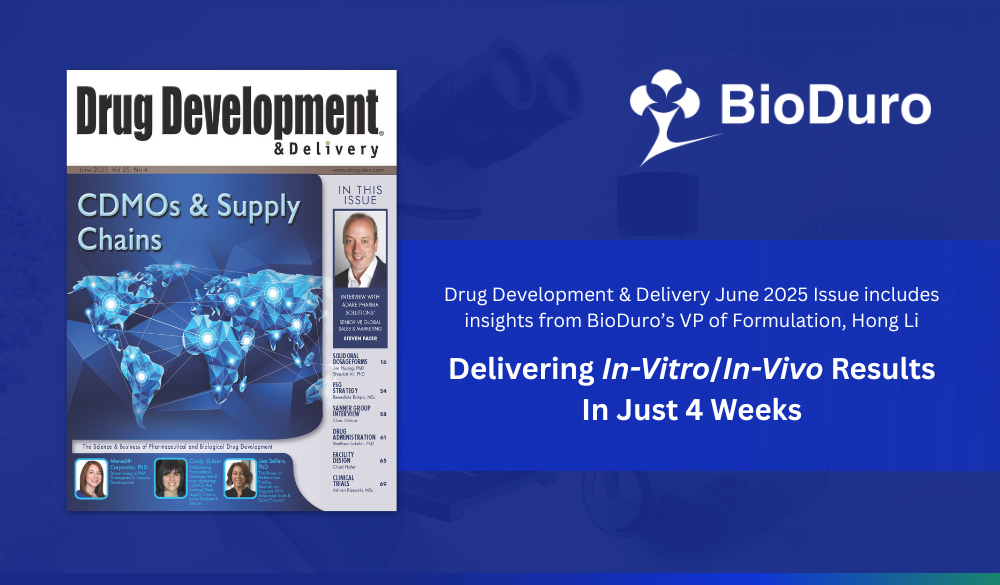


This article, with insights from Dr. Hong Li, Vice President of Formulation, BioDuro, was originally published in the Drug Development & Delivery June 2025 Issue: CDMOs & Supply Chains. View the DD&D June 2025 Issue (Vol 25 No 4) here: drug-dev.com
BioDuro delivers integrated preformulation, formulation development, and manufacturing services. Its formulation team is co-located with the API and DMPK teams, enabling accelerated IND-enabling services through seamless cross-functional collaboration.
“Our preformulation services are grounded in rigorous scientific analysis,” says Dr. Hong Li, Vice President of Formulation at BioDuro. “We conduct comprehensive physicochemical profiling – assessing pKa, logP, stability, and hygroscopicity assessments – to support optimal candidate selection and proactively address potential delivery challenges.”
For example, strategic salt and polymorph screening is employed to enhance crystal form stability and drug performance and advanced bioavailability enhancement techniques – including amorphous dispersions, co-crystals, and lipid-based formulations, which enable effective delivery of poorly soluble compounds.
BioDuro’s formulation capabilities support a broad range of dosage forms, including oral solids, injectables, topicals, and ophthalmics. A proprietary Solution Engine solubility platform is designed for speed and flexibility, with more than 100 successful IND filings. Dr. Li says: “We routinely deliver IND-ready formulations in 8-12 weeks, including animal PK studies. Utilizing cutting-edge enabling technologies such as spray-dried dispersions and hot-melt extrusion, we provide phase-appropriate formulations tailored to each stage of development, from preclinical through to commercial production.”
In fact, Dr. Li says there is increasing demand for integrated IND programs that can reduce both development timelines and overall costs. She says this can be attributed to a rising number of projects stemming from orphan drug designations and fast-track programs where CMC timelines are becoming more compressed.
BioDuro also has seen growing demand for development services, driven largely by the increasing complexity of drug molecules and the emergence of new therapeutic modalities such as GLP-1s, peptides, and antibody-drug conjugates (ADCs). Dr. Li explains that these innovations require advanced formulation strategies and highly customized development approaches, capabilities that many pharmaceutical companies may lack in-house. In addition, the growing prevalence of poorly soluble compounds has led to heightened interest in proven bioavailability enhancement technologies such as spray-dried dispersions and hot-melt extrusion. When paired with in vivo PK studies, these services are becoming increasingly popular for their ability to accelerate and de-risk development.
As an example, one biotech client approached BioDuro with a highly challenging early-phase API characterized by extremely poor solubility, limited available material, and an accelerated development timeline. “Speed and precision were essential, as the compound needed to advance rapidly toward preclinical evaluation,” says Dr. Li. “Due to the molecule’s poor solubility, we identified amorphous solid dispersion (ASD) as the optimal strategy to enhance bioavailability. Spray drying was selected as the enabling technology, given its shorter development timeline and minimal material requirements.”
BioDuro’s team began with comprehensive in silico modeling, screening more than 20 polymer/API combinations. “This virtual approach enabled rapid excipient selection without consuming any API and was completed within a single day,” she says.
Guided by the modeling results, the team minimized experimental screening by focusing only on the most promising API/excipient pairs. With a strategically designed experimental plan, a formulation was developed within two weeks using less than 100mg of API.
Subsequently, the DMPK team conducted two rounds of rodent pharmacokinetic (PK) studies to select the optimal ASD formulation. Compared to in vitro dissolution alone, in vivo PK data provided a more accurate assessment of product performance, she says. This stage was completed in less than 10 days.
“The result was a complete data package, including both in vitro and in vivo results, delivered in just four weeks,” says Dr. Li. “The final formulation demonstrated over a 12-fold improvement in bioavailability compared to the unformulated (neat) API. With robust PK data in hand, the client was able to initiate drug product manufacturing with us and move confidently toward IND filing.”
View the Drug Delivery and Development June 2025 Issue here: https://drug-dev.com/issues/june-2025/
